Search
Did you mean: Ino?
Summary 
Loading AI-generated summary based on World History Encyclopedia articles ...
Search Results
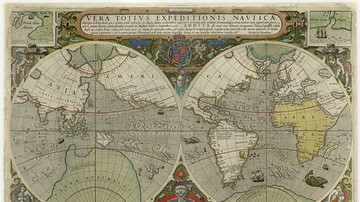
Article
Francis Drake's Circumnavigation of the Globe
The English mariner, privateer, and explorer Francis Drake (c. 1540-1596 CE) made his circumnavigation of the world between 1577 and 1580 CE. Only the second to achieve this feat after the expedition of the Portuguese explorer Ferdinand Magellan...
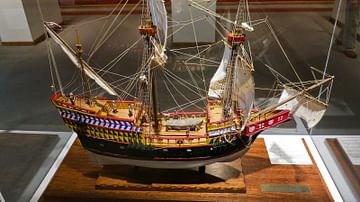
Image
A Model of the Golden Hind
A model of the Golden Hind, the galleon in which Francis Drake (c. 1540-1596 CE).
circumnavigated the globe in 1577-80 CE.
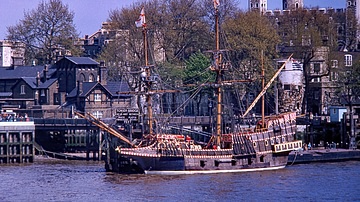
Image
A Replica of the Golden Hind
A replica of the Golden Hind, the galleon in which Francis Drake circumnavigated the globe between 1577 and 1580 CE.
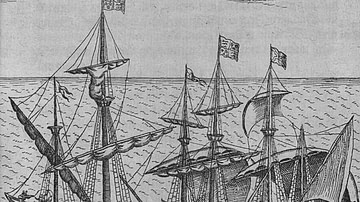
Image
The Capture of Cacafuego by the Golden Hind
A 1626 CE engraving by Friedrich van Hulsen showing the Golden Hind of Francis Drake capturing the Cacafuego treasure ship (real name: Nuestra Senora de la Concepćion) in March 1579 CE off the coast of Peru. The capture of the galleon was...

Definition
Galleon
The galleon (Spanish: galeón, French: galion) was a type of sailing ship used for both cargo carrying and as a warship. Galleons dominated the seas in the second half of the 16th century, and with their lower superstructures, they were much...
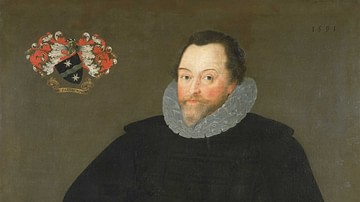
Definition
Francis Drake
Sir Francis Drake (c. 1540-1596 CE) was an English mariner, privateer and explorer who in 1588 CE helped defeat the Spanish Armada of Philip II of Spain (r. 1556-1598 CE) which attempted to invade the kingdom of Elizabeth I of England (r...

Article
The Sea Dogs - Queen Elizabeth's Privateers
The sea dogs, as they were disparagingly called by the Spanish authorities, were privateers who, with the consent and sometimes financial support of Elizabeth I of England (r. 1558-1603 CE), attacked and plundered Spanish colonial settlements...

Article
Etymology of the Name India
The name of India is a corruption of the word Sindhu. Neighbouring Arabs, Iranians uttered's' as 'h' and called this land Hindu. Greeks pronounced this name as Indus. Sindhu is the name of the Indus River, mentioned in the Rig-Veda, one...

Definition
Hercules
Hercules (Herakles) was a hero of Greek mythology famous for his great strength and endurance. Celebrated as an extraordinary mortal, his success in seemingly impossible labours won him an immortal place amongst the gods. As the greatest...

Definition
Thomas Cavendish
Thomas Cavendish (1560-1592 CE) was an Elizabethan mariner and privateer who famously circumnavigated the globe in 1586-88 CE, only the third voyage to do so and the first to set sail with that specific intention. Returning rich from Spanish...